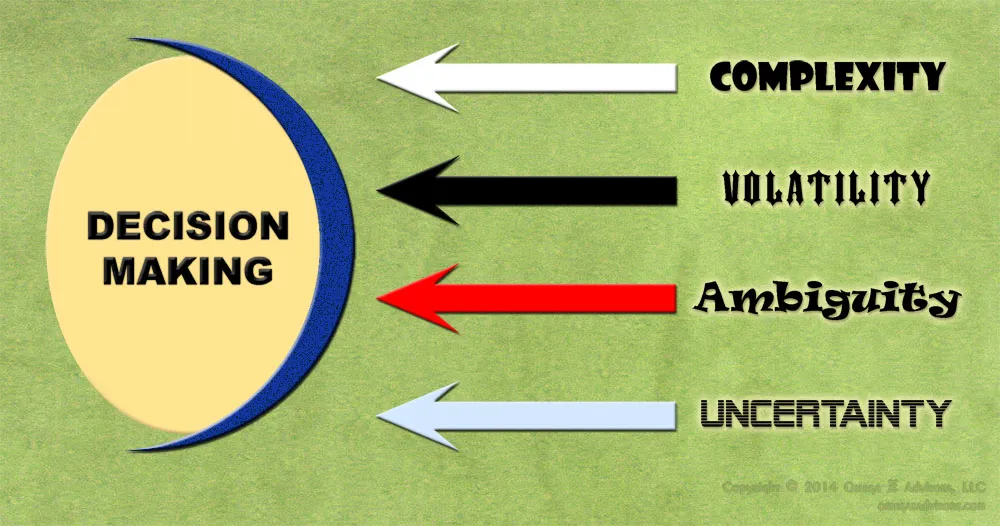The Four Horsemen of Apocalyptic Decision Making
- The Four Horsemen of Apocalyptic Decision Making
- Apocalyptic Decision Making – Dealing with Volatility
- Apocalyptic Decision Making – Dealing with Uncertainty
- Dealing with Complexity
- Dealing with Ambiguity
The four horsemen of apocalyptic decision making are Volatility, Uncertainty, Complexity and Ambiguity or VUCA for short. Just as customers do when they don’t understand, we tend to procrastinate, postpone or avoid decisions on events we don’t understand. These horsemen thwart our decision making in this way causing lost opportunities and more problems.
Nathan Bennett and G. James Lemoine in “What VUCA Really Means for You” (Harvard Business Review, January 2014 edition) provide basic definitions, examples and approaches for each in a brief table. Still, not understanding an event might diminish it in our minds but not in reality. Problems, like squirrels, don’t care about our mental boundaries.
Each horsemen strikes fear in our decision making. Since urgency and immediacy often drive us, we’ll waffle trying to keep up with volatility. Since we prefer certainty, we’ll discount or ignore uncertain factors. To simplify things, we’ll look for the silver-bullet rather than coordinate many solutions. To achieve understanding, we’ll create definition and quantification even if it means leaving out ambiguous intangibles. That is why these horsemen are also four of eight alerts that help us anticipate problems.
Rather than deal with the horsemen as Bennett’s and Lemoine’s table suggests, our fears will encourage us to see stability where volatility exists (prices won’t change anymore [see table’s examples]), to see certainty where uncertainty hides (competitor’s product launch won’t muddy the waters), to see simplicity in place of complexity (all customers basically need our product), and definition rather than ambiguity (we’ve done this before and succeeded so just follow the template).
Our emotional triggers for security (stability, certainty, simplicity and definition) are often so strong and the four horsemen so nebulous that rationalizing like this is easy. That is what makes them so apocalyptic and what we commonly call “being blindsided.”




Great list – as usual from HBR and expanded by Mike Lehr!!! I want to home in on the third one, ambiguity. I heard a long forgotten speaker (unfortunately) who introduced me to the phrase, “embracing ambiguity.” I believe doing just that – not ignoring, not acknowledging, but EMBRACING ambiguity – is a necessary characteristic of effective leading, effective learning (lifelong), and effective problem solving! Indeed, in the acronym for my personal problem solving procedure, OSCAR, THE “S” is Speedbumps; embracing ambiguity is so critical, it’s a separate step in problem solving.
As I often find happening, two quotes from Albert Einstein are right on: “We cannot solve our problems with the same thinking we used when we created them.” And: “Insanity: Doing the same thing over and over again, expecting a different outcome.”
Thank you, John. Yes, I found it a great list and very relevant to my experiences. Couldn’t we embrace all of these, not just ambiguity? I plan to write a short series elaborating on each one. I appreciate your encouragement. ~Mike
My favorite line out of this post!
‘Problems, like squirrels, don’t care about our mental boundaries.’
Thank you, Samantha, I pleased you liked it. I came up with it almost ten years ago at our other house. It had about a half dozen very large oak trees. It was a city lot so all the yards were clearly marked. Yet, the squirrels came and went as they pleased, many times crossing yards without ever touching the ground. The humor came to me when some neighbors got upset about cats and dogs coming onto their properties, and I was watching squirrels from my place go over to theirs. Squirrels were immune to their wrath. Thank you for visiting. ~Mike